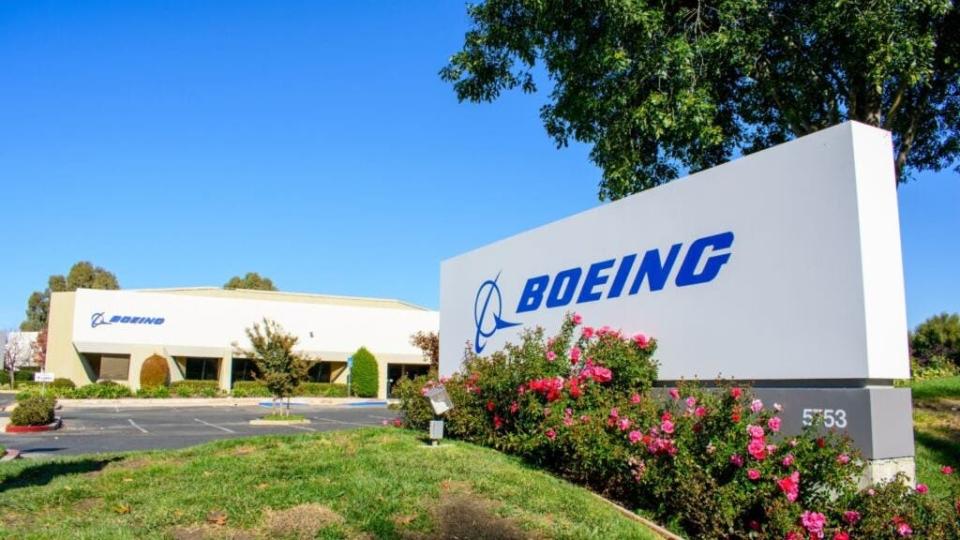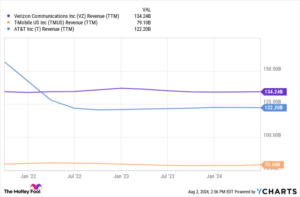If You Invested $1000 In Boeing Stock 20 Years Ago, How Much Would You Have Now?


Benzinga and Yahoo Finance LLC may earn commission or revenue on some items through the links below.
The Boeing Company (NYSE:BA) is set to report its Q3 2024 earnings on October 23. Wall Street analysts expect the company to post an EPS of ($0.02), up from ($3.26) in the year-ago period. Quarterly revenue is expected to be $19.45 billion, up from $18.10 billion in the year-ago period.
Trending: When today’s AI startups go public, most of the rapid growth will be behind them — here’s how not to get left out.
This is a paid advertisement. Carefully consider the investment objectives, risks, charges and expenses of the Fundrise Innovation Fund before investing. This and other information can be found in the Fund’s prospectus. Read them carefully before investing.
If You Bought Boeing Stock 20 Years Ago
Twenty years ago, the company’s stock traded around $35.25 per share. If you had invested $1,000, you could have bought approximately 28 shares of Boeing stock. Currently, shares are trading at $190.60, which means your investment’s value could have soared to $5,407 due to of stock price appreciation. But wait, the company also paid dividends during these 20 years, although it discontinued them in 2020.
Over the last twenty years, it paid around $47.76 in dividends per share, which means you could have made $1,354 from dividends alone.
Summing up $5,407 and $1,354, we end up with the final value of your investment, which is $6,761. This is how much you could have made if you had invested $1,000 in Boeing stock 20 years ago. This represents a total return of 576.1%, which is just slightly higher than the S&P 500 total return for the same period, which is 556.39%.
Don’t Miss:
What Could The Next 20 Years Bring?
Boeing has a consensus rating of Buy and a price target of $225.59 based on the ratings of 26 analysts, according to Benzinga. The price target implies around 18% potential upside from the current stock price.
On July 31, Boeing reported second-quarter 2024 results and named Kelly Ortberg its new President and CEO, effective Aug. 8, 2024. Boeing reported a second-quarter revenue decline of 15% year-over-year to $16.866 billion, missing the consensus of $17.23 billion.
Adjusted loss per share expanded to $ (2.90) from $ (0.93) in the same quarter of 2024, missing the consensus of $ (1.91). The company stated that the results primarily reflect lower commercial delivery volume and losses on fixed-price defense development programs.
Looking ahead, Boeing has provided guidance that reflects both cautious optimism and acknowledgment of the hurdles that remain. The company plans to increase production rates for its 737 and 787 programs by the end of the year, aiming for 38 and five units per month, respectively.
Boeing’s backlog remains robust at $516 billion, including over 5,400 commercial airplanes, which provides a cushion against short-term market fluctuations. The company also highlighted its comprehensive safety and quality plan submitted to the FAA, which is critical in restoring confidence and ensuring future operational stability.
However, Boeing’s substantial debt load, which increased to $57.9 billion from $47.9 billion due to new debt issuance, remains a concern that the company will need to manage carefully.
In summary, Boeing stock might not be the best choice for income-focused investors, given the discontinued dividends, current challenges, and the struggle to restore confidence after a number of safety incidents. Similarly, Boeing might not be a preferred choice for growth-focused investors, given its modest upside potential.
There are potentially better options, such as Taiwan Semiconductor Manufacturing (NYSE:TSM), reviewed by Benzinga. This stock offers a solid dividend yield and significant upside potential.
Better Than Boeing For Right Now?
The current high-interest-rate environment has created an incredible opportunity for income-seeking investors to earn massive yields, but not through dividend stocks… Certain private market real estate investments are giving retail investors the opportunity to capitalize on these high-yield opportunities and Benzinga has identified some of the most attractive options for you to consider.
For example, the Jeff Bezos-backed investment platform just launched its Private Credit Fund, which provides access to a pool of short-term loans backed by residential real estate with a target 7% to 9% net annual yield paid to investors monthly. The best part? Unlike other private credit funds, this one has a minimum investment of only $100.
Don’t miss out on this opportunity to take advantage of high-yield investments while rates are high. Check out Benzinga’s favorite high-yield offerings.
© 2024 Benzinga.com. Benzinga does not provide investment advice. All rights reserved.
This article If You Invested $1000 In Boeing Stock 20 Years Ago, How Much Would You Have Now? originally appeared on Benzinga.com





